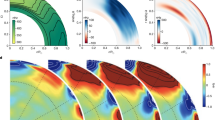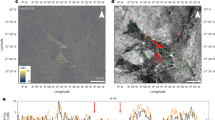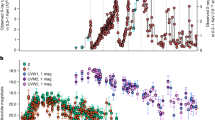Abstract
MANY years ago, I suggested that the bundles of solar electric rays which produce the auroræ and most magnetic disturbances are composed of electrons electrostatically neutralized by positive ions of great specific charge, mainly protons1–4.
This is a preview of subscription content, access via your institution
Access options
Subscribe to this journal
Receive 51 print issues and online access
$199.00 per year
only $3.90 per issue
Buy this article
- Purchase on Springer Link
- Instant access to full article PDF
Prices may be subject to local taxes which are calculated during checkout
Similar content being viewed by others
References
Vegard, L., Ann. d. Phys., 4, 853 (1916).
Vegard, L., Det Norske Vid. Akad. Skr., 1, No. 2 (1928).
Vegard, L., “Physics of the Earth”, 8, 573.
Vegard, L., Geof. Pub., 16, No. 1 (1944).
Vegard, L., Nature, 144, 1089 (1939).
Vegard. L., and Tønsberg, E., Geof. Pub., 13, No. 5 (1941); 16, No. 2 (1944).
Vegard, L., Phys. Soc. Gassiot Com. Report 1948.
Vegard, L., Trans. Oslo meeting of I.U.G.G. (1951).
Vegard, L., Geof. Pub., 18, No. 5 (1952).
Vegard, L., Report to the Sydney meeting of the Mixed Commission on the Ionosphere 1952.
Author information
Authors and Affiliations
Rights and permissions
About this article
Cite this article
VEGARD, L. Enhancement of Auroral Hydrogen Lines towards Lower Latitudes. Nature 170, 1120–1121 (1952). https://doi.org/10.1038/1701120b0
Issue Date:
DOI: https://doi.org/10.1038/1701120b0
Comments
By submitting a comment you agree to abide by our Terms and Community Guidelines. If you find something abusive or that does not comply with our terms or guidelines please flag it as inappropriate.



